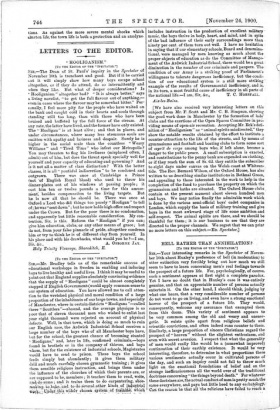LETTERS TO THE EDITOR.
"HOOLIGANISM."
[To THE EDITOR OP THE "SPECTATOR."] SIR,—The Dean of St. Paul's' inquiry in the Spectator of November 10th is trenchant and good. But if it be carried out it will simply show how many boys escape school altogether, or if they do attend, do so intermittently and when they like. But what of deeper considerations? Is " Hooliganism " altogether bad ? "It is always better," says a living novelist, "to get the full flavour out of anything,— even in cases where the flavour may be somewhat bitter." Per sonally, I feel more pity for the people who have waited on the bank and caught cold in their hearts and souls through Etanding still too long, than with those who have been bruised and buffeted by the full force of the stream. At any rate, the latter have lived, and the former have only existed. The "Hooligan" is at least alive ; and that in places, and under circumstances, where many less strenuous souls are smitten with apathy and laziness and despair. Surely he is higher in the social scale than the countless "Weary Williams" and "Tired Tims " who infest our Metropolis ? You may threaten to flog his liveliness (misplaced often, I admit) out of him, but does the threat speak specially well for yourself and your capacity of educating and governing ? And is it not all a matter of class distinction ? With the better classes, it is all youthful indiscretion" to be condoned and outgrown. There was once at Cambridge a Prince (not of English Royal blood) who used to throw his dinner-plates out of his windows at passing people ; it cost him ten or twelve pounds a time for this amuse- ment, besides compensation to the living targets. But he is now all that he should be. There was once at Oxford a Lord who &id things too purely " Hooligan " to tell of ; he was " sent down"; but he now bolds high office and respect under the Crown. But for the poor there is no condonation, and apparently but little reasonable consideration. My con- tention, Sir, is this. Reform the " Hooligan " if you Can; give him education, clubs, or any other means of grace ; but do not, from your false pinnacle of pride, altogether condemn him or try to think he is of different clay from yourself. In his place and with his drawbacks, what would you be ?—I am,










































 Previous page
Previous page